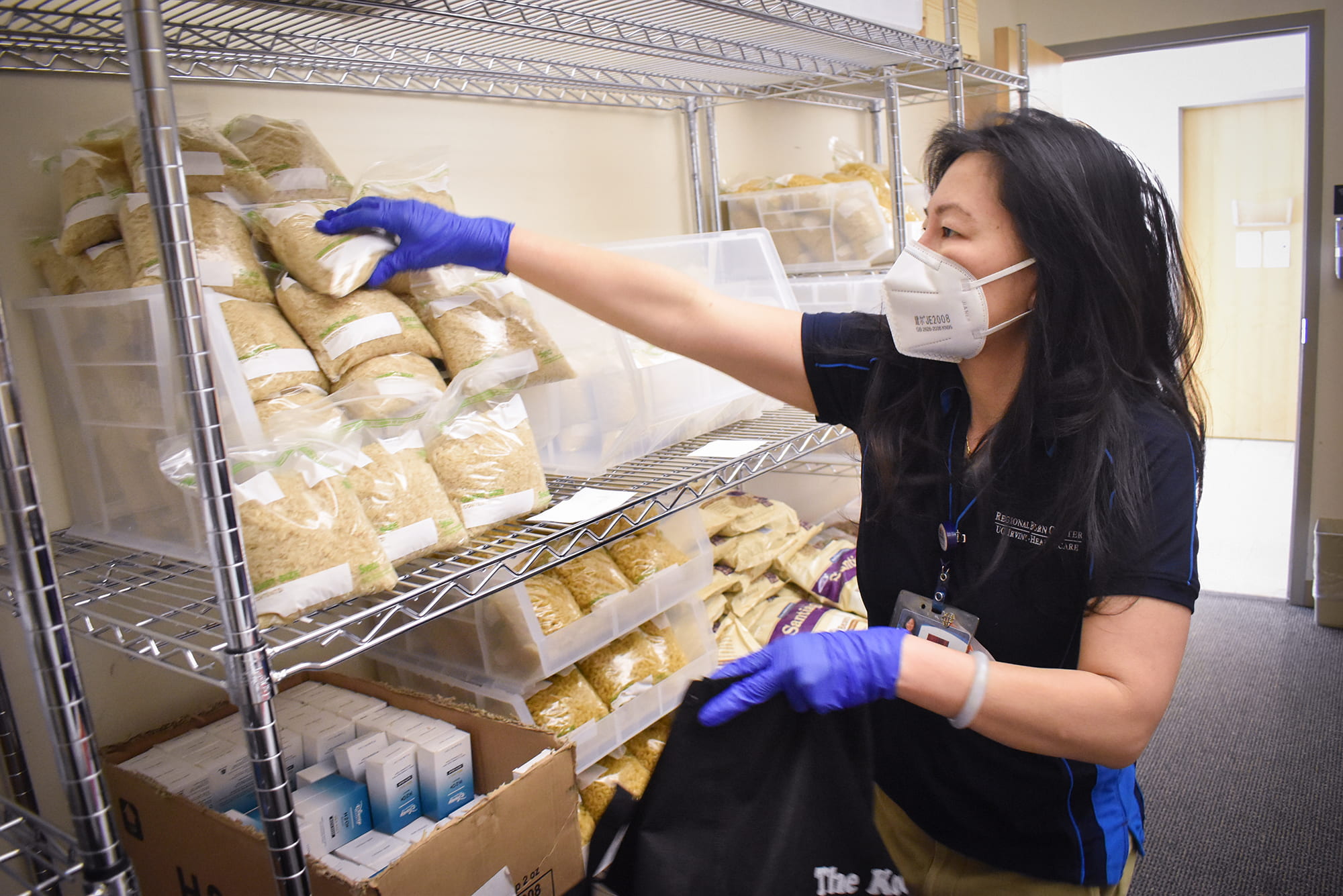Shopping during their shifts
UCI Health leadership creates free, on-site commissary for medical center workers amid coronavirus crisis

The section on the store shelf was empty.
“We’re out of oatmeal raisin,” the store clerk said. “Do you want any of these other bars?”
“Yes, whatever you have,” the shopper replied.
The clerk was actually Ted Lee, a volunteer stepping away from his usual job as an occupational therapist at UCI Medical Center.
The shopper was Gladys Newbury, a clinical social worker for UCI Health.
And the store was the lobby and a former conference room in Edward Shanbrom, M.D. Hall, Building 55 on the hospital campus.
Since late March, in addition to housing the Surgical Education Center, Shanbrom Hall has been home to a makeshift commissary where UCI Health workers can swing by during their shifts for a free bag of staples, including beans, rice, bread and – yes – even toilet paper.
Newbury visited the commissary for the first time April 16 midway through her day shift. Among the items she picked up were pasta, toilet paper, fruit and snacks for her two children, ages 5 and 7.
Chad Lefteris, CEO of UCI Health, came up with the idea for the commissary. He and other hospital executives are thinking of ways to make life easier for the roughly 4,800 people who report to work daily at UCI Medical Center during the COVID-19 crisis.
UCI Health pays for the food and other essentials, although there have been some donations, said Jacklyn Yi, a UCI Health business analyst in procurement and contracting who also manages the commissary.
“I think it’s very generous for our university to have this,” Newbury said. “It’s great because I can come here during working hours.”
She picks up her children from day care after her shift ends at 4:30 p.m. and is skittish about going to the grocery store with them on her way home.
“I don’t want to heighten their risk of exposure [to the virus],” Newbury said.
Streamlined process
The commissary is open daily from 7:30 to 9:30 a.m. and from 1:30 to 5:30 p.m.
Hospital executives developed a streamlined process for staff members to use it. Employees receive an admission ticket from their manager and go online to book an appointment. They show up at the commissary with the ticket and a form indicating which items they want.
As of April 16, an allotment of 5,000 tickets had been spoken for, with another allotment on the way, Yi said, adding: “We want to make sure everyone has an opportunity to use this service.”
On April 16, workers could choose to pick up either elbow or bowtie pasta; basmati, jasmine or parboiled rice; red or green lentils; white or wheat bread; and granola, chocolate chip or peanut butter bars.
Among other goods available that day were garbanzo, pinto, white or refried beans; canned pinto and black beans; apples, oranges, sweet potatoes, red potatoes and carrots; and miscellaneous provisions such as toilet paper, graham crackers, trail mix, pasta sauce, travel-size shampoo and sea salt soap.
One item is particularly in demand. “The rice has been flying off the shelf,” Yi said.
Commissary patrons put their $15 to $20 worth of selections in reusable, branded UCI Health bags.
“They’re just so touched and thankful that our executive leadership at the hospital is so invested in giving back to the employees,” Yi said. “We really want to make our staff members here feel like they’re appreciated for all they’re doing and that we have their backs. A lot of them are working around the clock providing patient care.”
She noted that managing the commissary has been a great way for her to meet UCI Health employees she wouldn’t during her usual job. “This is very fulfilling,” Yi said. “It’s a good change of pace.”
Commissary visitors have been very gracious, according to volunteers. “I’m hearing a lot of words of gratitude,” Lee said. “We’re all just doing what we can to help people out in these crazy times.”